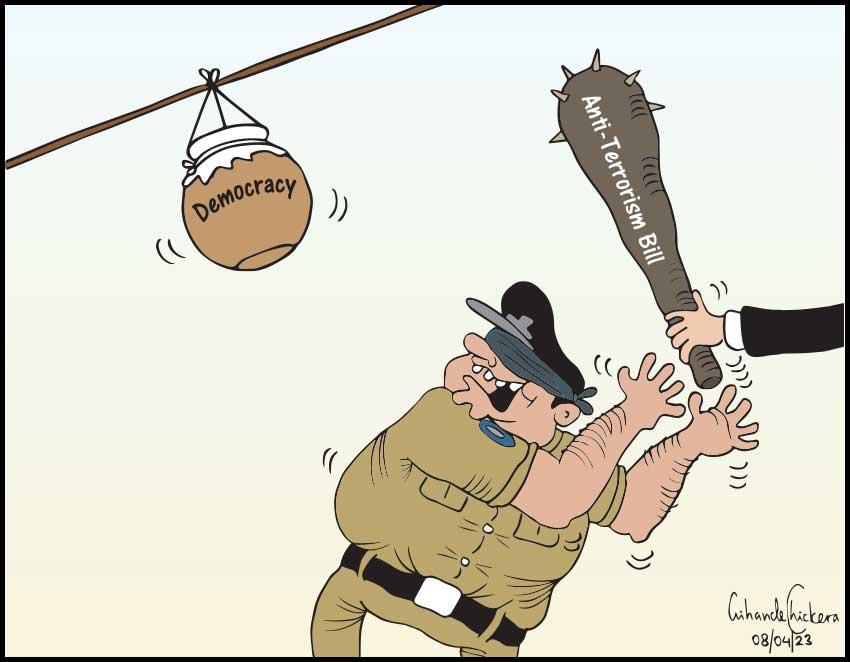The proposed “Anti-Terrorism Act” (ATA) should be considered in the context of Sri Lanka’s post-independent history that is full of abuse of power in political, legislative and judicial matters. One only needs to recall the terror used against peaceful protesters and dissenters against abuse of power and mismanagement of economy in recent times.
Sri Lanka’s track record of fundamental rights violations has been appalling. Many organisations and individuals, both local and international, have continuously expressed serious concerns about this ongoing situation and have urged the government many times to take remedial steps. The United Nations have called upon the government to address the issues of the broad definition of terrorism, prolonged pre-trial detentions and torture, and the targeting of minorities and political dissenters under the present Prevention of Terrorism Act (PTA) which has been in the government’s rulebook since 1979. The PTA did not and could not prevent the armed conflict for which all the precursors were set by successive regimes since independence.
The UN request was to repeal the PTA and replace it with a new law in accordance with international standards that is inclusive, transparent and participative. This requires narrowing down the vast scope targeted by a broad definition of terrorism and providing proper legal safeguards for those detained under such law. It also requires allowing independent monitoring of all places of detention where they are held.
On the contrary, the proposed Bill is designed to reinforce systematic violations of fundamental human rights by further widening the scope of the definition of terrorism, so that those holding political power could use it against any entity or individual whom they wish to silence.
With the President and the security forces given wide powers without the need for proper judicial oversight, it enables detention of people without evidence, arbitrarily proscribe organisations and meetings, and criminalise criticism, dissent and protest. The Minister of Justice has repeatedly stated that no major changes would be made to the Bill, and his recent claim that it will help promote reconciliation among communities is farcical. The international community won’t have a bar of it.
It is in this light that an earnest Appeal to all Members of Parliament of Sri Lanka is made not to enact the proposed Anti-Terrorism Act, and to give democracy and the rule of law the utmost priority. It is high time the government listened to the cry of its citizens and enact laws that are only in the ‘people’s interests’. The said letter, sent yesterday, is as follows:
An Earnest Appeal to All Sri Lankan Parliamentarians
23 April 2023
Hon. Prime Minister, Cabinet Ministers and Members of the Parliament of Sri Lanka
Do not enact the proposed Anti-Terrorism Act
Democracy and the rule of law must come first.
One of the most solemn duties of a parliamentarian is to make new laws and change existing laws – keeping the views and interests of their constituents at heart. Carefully scrutinizing parliamentary bills, debating policies for the common good, and reviewing government decisions, are part and parcel of carrying out this paramount duty.
With the Anti-Terrorism Act bill to be presented to the parliament in the coming week, we ask you to exercise due diligence, conscious of the long-lasting consequences it will have on people’s lives and future generations.
The country has suffered immensely under the current PTA for over four decades. It is incumbent upon all our parliamentarians to right the wrongs of the past and get this bill right. What are the sticking points? There are many, including the following:
* The bill that is brought to replace a ‘bad law’ is in fact much worse than the current one.
* It doesn’t meet the benchmarks stipulated by the UN with respect to counter-terror laws.
* The offences referred to in the bill are wide-ranging, vague and subjective, with potential for abuse and miscarriage of justice.
* A Deputy Inspector General of Police could request non-judicial detentions, and arrests would occur before any formal charges are submitted.
* The President can proscribe persons and organizations without judicial oversight.
* It has the potential to label and delegitimise those the government considers to be its political enemies; dissenters and protesters could be held in jail for unspecified periods.
* The bill lacks provisions to prevent arbitrary arrest, detention and torture, and due process and fair trial guarantees – thus, breaking the government’s pledge to the international community to uphold human rights.
* It grants police and military sweeping powers to stop, question, search, and arrest anyone, or seize any document or object without a warrant, if they believe they have “reasonable grounds”.
* Replacing a bad law with a worse one won’t reap any economic benefits from the EU (GSP+ tariff concession) or other international donors, as claimed by the President. The international community cannot be deceived.
With so many vague provisions, the bill is ripe for abuse and will inflict long-term painful repercussions for society as a whole. In view of these, the bill in its current form must be scrapped.
As politicians holding power, we appeal to you to do the right thing with moral conviction and integrity. This is one such moment we hope that public interest, political honesty, and respect for the rule of law will triumph over self-interest.
PLEASE VOTE NO TO THE PROPOSED ANTI-TERRORISM ACT with courage and conviction.
To do otherwise would suggest that the nation’s collective will had withered when faced with the task of saving it from self-annihilation – socially, politically and economically.
Voice For Democracy in Sri Lanka, International Network
Australia, Canada, Europe, the UK and the USA


